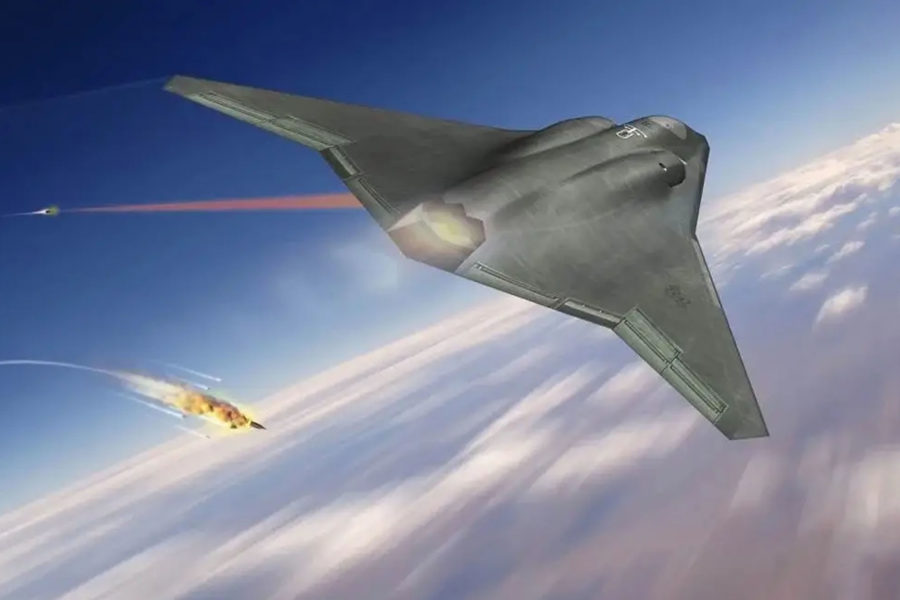Northrop Grumman won’t compete to be the prime contractor on the hyper-secret Next-Generation Air Dominance fighter program, but hasn’t ruled out a bid for the Navy’s corresponding F/A-XX or the Air Force’s Collaborative Combat Aircraft programs, CEO Kathy Warden said July 27 in a second-quarter results call.
“We have notified the U.S. Air Force that we’re not planning to respond to the NGAD RFP (Request For Proposals) as the prime,” Warden said. She did not rule out being a partner or supplier to other NGAD bidders, however.
Northrop’s portfolio includes combat aircraft like the B-21 bomber; reconnaissance aircraft such as the RQ-4 Global Hawk; electronic warfare systems; radars; sensors and aircraft structures, as well as solid rocket motors and hypersonic engines, among other business lines.
Northrop had withheld comment on NGAD until the Air Force announced “their intent to issue the RFP,” Warden said. The Air Force released the NGAD RFP in May and aims to select a winning contractor in 2024.
It wasn’t clear from Warden’s comments when the company informed the Air Force it won’t bid on NGAD. Media reports have indicated that the NGAD horse race is down to two competitors, and Northrop may already have been knocked out of the competition. But the Air Force has said any qualified offeror is welcome to make a proposal on the program.
Neither Boeing nor Lockheed Martin, the other two largest aerospace contractors, have stated officially an intent to bid on NGAD, but Lockheed officials have talked extensively about what might go into NGAD and its “family of systems,” including uncrewed escort aircraft.
Warden couched Northrop’s decision as part of a strategy: “Remaining disciplined in assessing the right programs to pursue.” Those “right” programs, she said, should offer “an appropriate balance of risk and reward, for both the customer and the industrial base.”
But, Warden added, “we have other opportunities in military aircraft that we are pursuing.” Northrop backed out of the T-X advanced trainer competition in 2017, even after building a flying, full-scale prototype. After reviewing the final RFP, officials said at the time, they did not see the business case for a profitable program.
Northrop has also withdrawn from or opted not to pursue other programs, such as the second KC-X tanker competition; a Navy carrier-capable drone; and the Navy’s 1980s-era A-12 competition.
In most of those cases, the winning bidder wound up absorbing huge losses. Boeing, which ultimately won the tanker and trainer contests, has paid dearly for the privilege, losing more than $7 billion on the fixed-price KC-46 tanker program and now taking losses on the fixed-price T-7 Red Hawk Advanced Trainer, as well. The company has said it will be more careful about the risk of underbidding in the future.
Asked about the F/A-XX—the Navy’s version of NGAD—Warden said Northrop hasn’t decided if it will bid or not. If there are programs where “we’re well-positioned, and the government is appropriately balancing risk and reward … that would be a program we would pursue,” she said, declining to be more specific “until a little more information comes out.”
The Air Force and Navy are comparing notes on their respective next-generation fighters but will not join them together as with the F-35.
While Warden ruled out bidding on NGAD, she held open the possibility of bidding on the Air Force’s Collaborative Combat Aircraft program.
“It is a separate solicitation,” she said. “We’re looking at it closely.” The CCA program is expected to yield a modular, uncrewed aircraft to carry sensors, extra munitions, perform electronic warfare, or do other missions in collaboration with crewed fighters and bombers.
Warden said Northrop is looking for new business as older programs like the F/A-18 fighter, for which Northrop builds the aft fuselage and vertical tails, wind down. The F/A-18 comprises just 1 percent of Northrop’s sales.
The Air Force is drawing down its RQ-4 fleet, but Northrop is believed to have built a successor, the RQ-180, which is highly stealthy and may have paved the way for the B-21. Warden referenced a number of classified programs in her presentation.
Warden said Northrop will continue to consider each opportunity on its own merits. Northrop doesn’t apply a “blanket” policy across the board, she said. “We think about each opportunity in terms of its risk profile,” she said. “The maturity of our designs and offerings at the time that we’re being asked to bid also weighs heavily into our thinking about that decision.”


